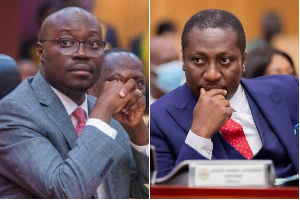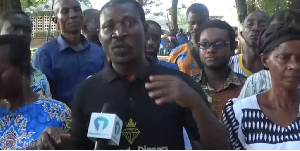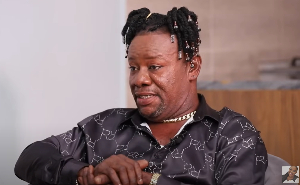One good product of the democracy in Ghana is the flourishing press freedom. We have large numbers of newspapers, television and radio stations and a vibrant online papers and discussion fora. It is this atmosphere that has driven our fledgling democracy this far and has allowed non-journalists like us to say our mind and get heard.
For many Ghanaians nowadays, nothing is true unless it is on the front pages of papers such as the Daily Graphic, Ghanaian Times and the Chronicles or broadcast in the news on GBC, TV3, Joy FM and many other papers, television stations and radio stations. We are able to have radio, TV and chat room conversations on line about anything. What else will the fighters who fought day and night against the culture of silence would want more? In spite of all the problems and propaganda against journalists in general, journalism in Ghana is doing well and with a little more effort Ghana will have a media competitive with any other anywhere and worthy of the country.
However, the fact remains that some sections of “journalism” these days is "a disaster”. Some few journalists like some other Ghanaians are more and more demanding payment and opportunism for everything including doing their duties. These opportunity-maximizers are destroying journalism in Ghana and unless media chiefs institute some basic ethics rules, the parasites within their ranks could end up making sure there's no journalism industry left to save.
As the fourth estate in the realm, the media is supposed to be the ears and eyes and, therefore, the watch dog of our democracy. What kind of democracy are we going to have if the media that are supposed to stand guard and demand accountability have sacrificed integrity for corrupt practices? I have a saying that goes like “Show me your journalism and I will show you your democracy and state of your country”. In Ghana these payments and opportunisms by journalists come in various forms.
The practice where journalists who cover programs and events are given monies called “Soli” (short for solidarity) or T&T (time and transport) apparently to “cover the cost of travel to the event” is an old practice in Ghana known and practiced by most media houses and journalists. But everybody knows that the amounts are way more than the cost of a taxi or trotro ride and are not given to the foreign reporters. This practice is embedded in journalism in Ghana and has virtually become an accepted practice. Some journalists are not satisfied with the refreshment served in such functions. The Ghana Journalist Association cannot say they are not aware of it. But what have they done about it? Where is the objectivity and independence if you demand Soli and other gifts for a story? It is this sense of entitlement to some payment for covering events from event-organizing bodies that has gradually evolved into outright corrupt practices in the duties of some journalists.
In a polarized political atmosphere prevailing now in Ghana, most journalists have already taken sides. In fact, politicians hold the grip over their “most loyal” journalists and so misinform public opinion. There is an extreme scenario that is gradually developing in Ghana that seems to becoming the modus operandi of some of the media houses and propaganda machineries of the political parties. This involves a malicious, powerful and self-pitying media that manages to twist, distort and manipulate information in a bid to undermine their political opponents while making itself and their favored political leaders look like victims. Party stalwarts have established their own newspapers with an army of journalists who are given preferential treatments and extra benefits to act as propaganda machines for their parties. This leaves the others to find other means mostly dubious to also have a share of the cake.
There are the others who have very little journalistic abilities and therefore, less hope of making money genuinely and who have constituted themselves into a group that does the dirty jobs of the highest bidders. What is dangerous about the whole phenomenon is that most of these people are well educated and have control over language and the pen. These journalists have no shame and have thrown integrity to the dogs acting as the crusading attacking dogs to the pushers of brown envelopes particularly when it helps them to fight their personal wars. They fill the pages of their papers with sensational headlines, misrepresentations of fact and blatant political bias stories.
Others have developed the skill of lying. It is amazing how well some people both journalists and non-journalists have developed the ability of concocting fantastic stories about others just to serve their political paymasters. Such journalist will do anything to kill a story or present it in another light to favor the pusher of the brown envelope. I suggest that such people should leave journalism and go into writing novels and storytelling. It is amazing how they are able to come out with stories out of half truths and outright lies and still let it stick on others.
As I have said earlier, Ghanaians want extra money and payment for everything including doing their duties. This is particularly affecting young media houses that don’t have the resources to pay heavy salaries to journalists in their formative period. But low salary is not an excuse to use corrupt practices in making up for lost wages. It undermines the noble profession of journalism. Journalism like any profession that relies heavily on personal integrity demands a lot of sacrifice but it pays off at the end of the day.
In an election year, these practices are becoming pervasive. It incumbent upon the Ministry of Information, Media Commission and the Ghana Journalists Association to sit up and find ways to weed out not only the corrupt journalists but the conditions that breed these practices in the media. It will be a mistake for the vast majority of journalists and the GJA to look on helplessly while this degradation in journalism is going on. Most of the problems associated with our political discourse such as the culture of insults are manifestations of the problems in the media.
If journalism goes to the gutters, our country and our future will go with it. So we better sit up.
Kwame Yeboah
gyeboah@harding.edu
Opinions of Tuesday, 9 August 2011
Columnist: Yeboah, Kwame


















